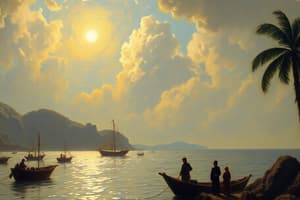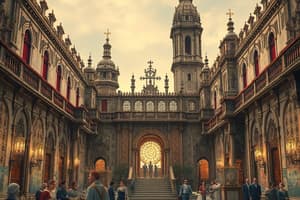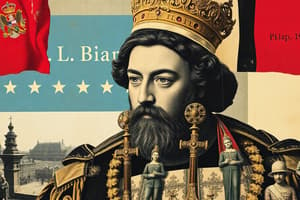Podcast
Questions and Answers
Which political concept, influenced by philosophers like Jean Bodin, claimed that monarchs were directly appointed by God to rule absolutely?
Which political concept, influenced by philosophers like Jean Bodin, claimed that monarchs were directly appointed by God to rule absolutely?
- Divine Right of Kings (correct)
- Machiavellian Monarchy
- Papal Supremacy
- Divine Right of Bishops
During the 16th and 17th centuries, what were the conflicts between Catholic and Protestant powers in Europe known as?
During the 16th and 17th centuries, what were the conflicts between Catholic and Protestant powers in Europe known as?
- Crusades Revival
- Peace of Westphalia
- Enlightenment Wars
- Wars of Religion (correct)
Which European country, as a predominantly Catholic power, was often involved in the conflicts between Catholic and Protestant powers?
Which European country, as a predominantly Catholic power, was often involved in the conflicts between Catholic and Protestant powers?
- France
- England
- Sweden
- Spain (correct)
Which dynasty rose to power during the period of Spanish colonization and European absolutism?
Which dynasty rose to power during the period of Spanish colonization and European absolutism?
According to Machiavelli, what form of government did he argue for to effectively manage territory and protect interests?
According to Machiavelli, what form of government did he argue for to effectively manage territory and protect interests?
Which concept, supported by Machiavelli, influenced many European rulers to seek absolute power?
Which concept, supported by Machiavelli, influenced many European rulers to seek absolute power?
Who led the expeditionary forces that overthrew the Aztec confederation in Mexico?
Who led the expeditionary forces that overthrew the Aztec confederation in Mexico?
Which dynasty ruled Spain during the consolidation of the Spanish empire in the 16th and 17th centuries?
Which dynasty ruled Spain during the consolidation of the Spanish empire in the 16th and 17th centuries?
Who is known for his influential political theories that impacted Europe, including Spain, during the 16th century?
Who is known for his influential political theories that impacted Europe, including Spain, during the 16th century?
Which political concept emphasized the power and authority of monarchs during the period of European absolutism?
Which political concept emphasized the power and authority of monarchs during the period of European absolutism?
Which explorer discovered the Pacific Ocean from the Isthmus of Panama, contributing to Spanish colonial expansion?
Which explorer discovered the Pacific Ocean from the Isthmus of Panama, contributing to Spanish colonial expansion?
During which war did the Habsburgs compete with France for dominance in European politics?
During which war did the Habsburgs compete with France for dominance in European politics?
Flashcards are hidden until you start studying
Study Notes
Spain's Empire and European Absolutism
Spain's empire was a significant part of the global landscape in the 16th to 18th centuries, with its influence stretching across Europe and the Americas. This period saw the rise of European absolutism, a political concept that emphasized the power and authority of monarchs.
Spanish Colonization
Spain's colonial expansion began in the late 15th century with the conquest of the Americas. Expeditionary forces led by Hernán Cortés overthrew the Aztec confederation in Mexico, and Vasco Núñez de Balboa discovered the Pacific Ocean from the Isthmus of Panama. These conquests opened up new lands and resources, leading to the establishment of Spanish colonies in the Americas. The Spanish empire included vast territories in North, Central, and South America, as well as parts of the Caribbean.
Habsburg Spain
The Habsburgs were a powerful dynasty that ruled Spain from the late 15th to the 17th centuries. This period saw the consolidation of the Spanish empire, with the Habsburgs centralizing power and establishing a strong central government. The Habsburgs also played a significant role in European politics, often competing with other powers like France for dominance.
Machiavellian Politics
The political theories of Niccolò Machiavelli, an Italian philosopher and statesman, had a significant impact on the political landscape of Europe, including Spain. Machiavelli argued for a strong, centralized government that could effectively manage its territory and protect its interests. His ideas influenced many European rulers, including those in Spain, who sought to establish absolute power.
Divine Right of Kings
The concept of the divine right of kings, which held that monarchs were directly appointed by God to rule, was a significant political idea during this period. This idea, which was popularized by philosophers like Jean Bodin, held that monarchs had a divine mandate to rule absolutely and without interference from other powers or institutions.
Wars of Religion
The 16th and 17th centuries saw several conflicts between Catholic and Protestant powers in Europe, known as the Wars of Religion. These conflicts were driven by religious differences and political power struggles. Spain, as a predominantly Catholic power, was often involved in these conflicts, both directly and indirectly.
In conclusion, Spain's empire and European absolutism were closely intertwined during the 16th to 18th centuries. The consolidation of the Spanish empire, the rise of the Habsburg dynasty, the influence of Machiavellian politics, the acceptance of the divine right of kings, and the complications of the Wars of Religion all played significant roles in shaping the political landscape of Europe and the Americas.
Studying That Suits You
Use AI to generate personalized quizzes and flashcards to suit your learning preferences.




